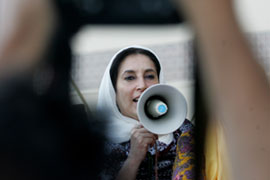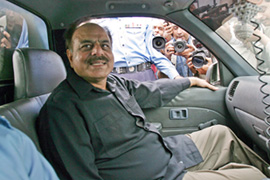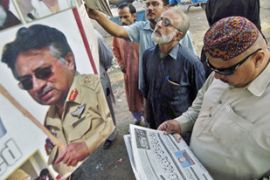She said: “It is in the best interests of Pakistan and the Pakistani people for there to be a prompt return to the constitutional course, for there to be an affirmation that elections will be held for a new parliament and for all parties to act with restraint in what is obviously a very difficult situation.”
|
|
“Musharraf has many enemies in his country and I believe with Bhutto as PM there would be more people supporting the goverment”
Howahr, Doha, Qatar
Send us your views
|
Rice said Musharraf, a close US ally in the fight against al Qaeda and the Taliban, had previously been told that the US would not support such a move.
China, another of Pakistan’s closest allies, also expressed concern over the move.
“We are concerned about the situation in Pakistan, and believe the Pakistani government and people are capable of solving their problems,” Liu Jianchao, the foreign ministry spokesman said.
Musharraf had asked for understanding of the “criticality of the situation in Pakistan and around Pakistan” from Pakistan’s “frineds” in the US, the European Union and the Commonwealth.
However, David Miliband, the British foreign minister, said he was “gravely concerned” by the measures and urged Pakistan to harness “the power of democracy and the rule of law to achieve the goals of stability, development and countering terrorism”.
Dialogue urged
The French foreign ministry called on Musharraf to “maintain the rule of law” and develop dialogue between all Pakistani political forces.
The European Union’s executive arm expressed similar concern and Australia urged Pakistan to return to constitutional rule.
 |
|
Bhutto has described the emergency declaration as martial law AFP]
|
Pakistan’s neighbour and nuclear rival, India, was more circumspect, expressing “regrets” over Musharraf’s ruling.
“We wish them stability and we look forward to conditions which will facilitate conditions for democracy to be restored in that country,” Anand Sharma, India’s junior foreign minister, said.
Afghanistan, Pakistan’s northern neighbour, said it wanted the country to return to normal quickly in the interests of its own stability.
“Security and stability in Pakistan directly affect the situation in Afghanistan and vice versa,” Sultan Ahmad Baheen, a foreign ministry spokesman, said.
“We are following the situation in Pakistan with concern and very seriously. We want stability and peace in our neighbouring country.”
Bhutto’s warning
Within Pakistan, Benazir Bhutto, the former prime minister, warned the country was slipping back toward dictatorship.
“This is not emergency, this is martial law and the people of Pakistan will protest against it,” she said after returning home from Dubai on Sunday.
Lieutenant-General (retd) Talat Masood, a defence analyst, told Al Jazeera that Bhutto was “very upset with the emergency situation” and that it “will give her very little space to operate”.
Under the present conditions, it remains very difficult for Bhutto to operate, Masood said.
“She is trying not to take a position of confrontation with President Musharraf because her dialogue with him is continuing”.
He said of Bhutto’s talks with Musharraf: “For all you know the deal which had taken place might be under great strain and may break”.
‘Out of control’
A former head of the Inter-Services Intelligence (ISI) arrested in Islamabad on Sunday told Al Jazeera that the situation in his country was getting out of control.
Lieutenant-General (retd) Hamid Gul said: “This is not an emergency, this is martial law. Let’s be very clear about it – there is no constitution today in Pakistan and therefore the provision of emergency which is a constitutional clause is no longer applicable.
|

|
| Gul says Musharraf has crossed his limit [AFP] |
“Musharraf has crossed his limit, he has transgressed his limit and I think he has created a lot of problems for Pakistan.”
One Indian analyst told Al Jazeera that it was “shrinking options” that encouraged General Musharraf to carry out emergency rule in the country.
Uday Bhaskar said it was the “spate of suicide bombers” that most likely drove Musharraf to implement emergency rule to save “Pakistan from suicide”.
The Pakistani press condemned Musharraf’s declaration. The English-language newspaper Dawn called it his “second coup” following the first putsch that brought him to power in October 1999, saying: “The people have been cheated”.
An editorial in The News on Sunday, another English-language newspaper, lablled the decision “Black Sunday”.
“It can be safely said that this is one of General Pervez Musharraf’s gravest errors of judgement,” it said.
“Such a draconian step will also give little effect on our ability to fight terrorism and extremism.”


